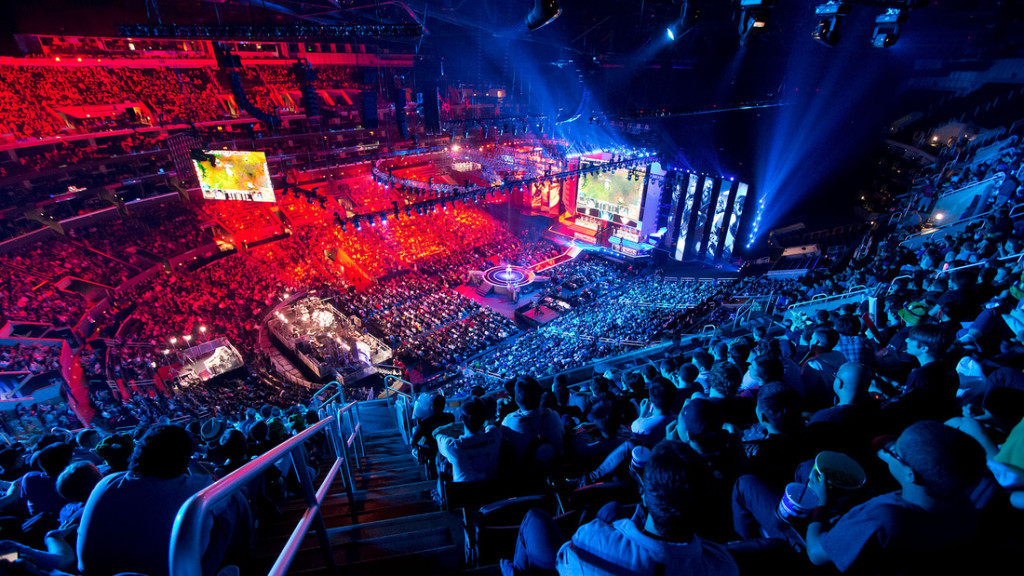Andy Miller is the latest traditional sportsman to invest in eSports. He and fellow Sacramento Kings co-owner Mark Mastrov even brought along co-owners Shaquille O’Neal, Alex Rodriguez, and Jimmy Rollins to help Team NRG compete in League of Legends and Counter-Strike: Global Offensive.
Miller, who previously served as vice president of mobile advertising for Apple, has gone all-in with eSports. With his background in technology and sports (he also is co-owner of the Modesto Nuts minor league baseball team), professional video gaming blends both of his specialties.
He discusses the future opportunities eSports opens up, and how pro gaming may influence traditional sports in the [a]listdaily exclusive.

We’re starting to see an explosion on the college level eSports, even seeing some schools giving scholarships for them. On the other side, like the NBA’s D League, you have amateur leagues like League of Legends has set up with Coca-Cola. What role do you see those two avenues playing as the eSports ecosystem grows?
I think that’s huge. If you don’t play Little League Baseball, you’re probably not going to be a Major League Baseball fan. It’s a known fact. So the fact that we have so many people playing, whether they’re getting a college scholarship to play, whether they’re playing on their own, whether they’ve got their own group of five guys that they get together, that’s how you grow a giant fan base over the years. And this is the sport that people are playing—and it’s not just kids. Our fan base is probably a lot older than I think most marketers think.
How do you go about choosing which games you’re going to focus on?
We wanted League of Legends right off the bat. I researched it and loved the energy. And you can’t deny the size of the audience. It’s massive. We play in front of so many people every week, whether on our own streaming with our guys or on the weekend at Twitch. And then you stack those numbers up against the NBA and NHL and other sports and it’s worth it. So that was a no-brainer for us. We also added a CS:GO team, which is probably the second biggest eSport, where it has a massive following and a huge amount of people playing.
What are your thoughts on mobile eSports, where Vainglory and Hearthstone have proven the model works?
I think it’s natural. Someone asked would the future be an eSports television network. I think it’s amazing that Turner’s going to have a live prime time program, but the reality is it doesn’t really matter anymore. Television is yesterday. If you’re playing the game on your mobile device, you’re probably going to be watching it on that device as well because that device is going to be capable of broadcasting the matches. That’s key; that you spread out across all different devices, all different platforms, and all different games. That’s been our goal. We want to take it slowly enough that we don’t overextend ourselves, but we would like to be a brand where people recognize NRG like they recognize Manchester United or the Yankees, where it stands for something. And that whatever the sport is, we have our positive message.
There are small eSports arenas building up in Irvine and Austin. What role do you feel that will play, or will traditional NBA and NHL type stadiums be the future home for eSports as it grows?
I think it’s going to be both. There’s no doubt that we’re going to see traditional stadiums; NBA’s the best fit. You have an arena like Golen 1 Center and we should be having a home base there for whatever this eSport is. That’s where you see the interest from the Warriors and the Kings ownerships and other folks getting into this space.
But these smaller venues are just as important. Right now, it’s movie theaters. People don’t have access physically to the players. They have unprecedented access digitally, socially to the players in eSports, but physically they don’t. So they never really get to see GBM, one of our most popular players, play. When we go to the mall in LA they literally get a bunch of people stopping them for autographs. They’ve got to stop wearing their shirts. But in other professional sports, the players are visibly accessible, physically accessible, but not really digitally, so eSports is kind of on its head.
It’s also different that these guys are practicing with their chats on and livestreaming. It’s like you can talk to Shaq while he’s practicing for the game. You can ask [eSports pros] what champion they’re going to play this weekend, why did they do this—and they respond, and they stay up all night doing it. That’s an unprecedented level of accessibility, but that’s what this generation expects. And that’s why they don’t connect as well to some of the other [traditional] sports athletes.
What impact do you see kids growing up with eSports having on the NBA and other sports 10 or 20 years down the road?
That’s a good question. It’s a big initiative for every league to get younger. Social media has been fantastic. The NBA is the clear leader in social, digital, and technology across the board. Major League Baseball Advanced Media is wonderful, but I think as far as being early on social and understanding it, and the players totally grabbing onto it and running with it has made the NBA the hippest sport. These players know how to interact with their fans. They have their own brands, and it’s wonderful. It’s wonderful for us to have big stars in every city. It’s not just the big cities anymore, so it’s a big deal.
NRG co-owners Shaq, Alex Rodriguez, and Jimmy Rollins have huge social media followings. The eSports audience is all about social media. How do you see these two connecting?
Shaq does all of his own social media. He’s posting NRG stuff on Twitter and Instagram and everywhere. Having guys like Jimmy Rollins and Alex Rodriguez, who have been in the league for so long, is great. Our guys were beyond ‘over the moon’ for Shaquille to be involved because they love him and they think he’s hilarious. It’s wonderful to have that attention, but they’re very interested in having Jimmy and A-Rod come to see them when they go play the Angels or the Dodgers, to talk to them about how they handled the pressure and how they were able to thrive under it. There’s a lot of pressure in eSports just like there’s a lot of pressure in traditional sports.

